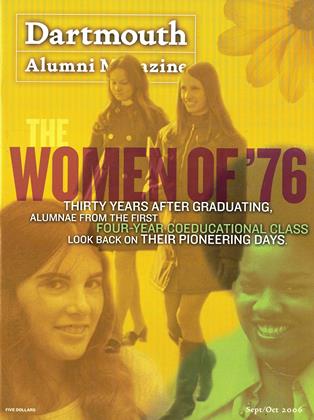Bob Dupuy ’68
Major League Baseball’s president on America’s pastime
Sept/Oct 2006 Lisa FurlongMajor League Baseball’s president on America’s pastime
Sept/Oct 2006 Lisa FurlongMajor League Baseball s president on America's pastime
"What has struck me over the 38 years since I graduated is that as much as the campus changes, it remains the same." "Growing up in Connecticut, my family had a lot of dining room table conversations about the relative merits of our teams. My father was a Giants fan. My mother was a diehard Red Sox fan. My team—the Yankees—often had the upper hand." "I deserted the Yankees in my teens when they fired Mel Allen and replaced Phil Rizzuto. I used to jump around between various teams and loyalties depending on the team I could hear late at night on the radio."
"If a team is behind in the playoffs I'll root for them, but whenthey get tied 3-3 in a series they're on their own."
"Fans either reflect the personality of their city or the personality of the ballplayers on the field. The fans Philadelphia are very knowledgeable and very unforgiving—and extremely aggressive. Fans in Los Angeles arrive late. In many of the smaller Midwest communities such as Pittsburgh or Detroit or Minneapolis or Milwaukee, fans tend to be more blue-collar and clearly identify with the players as their warriors. Given San Francisco's array of food at the ballpark and the views, Tony Bennett g could write another song."
"For sheer athleticism the best mascot is the Astros' Coyote Jack, who always wins the whiffle-ball home run derby at the All-Star game—but I like the Phillies' Fanatic."
"There isn't another rivalry in any sport that matches the intensity of the Yankees-Red Sox. Trades such as those of Roger Clemens or Johnny Damon only intensify that."
"Kids will not sit and watch a game of any sport for three hours and not do something else.We want them online with us."
"Baseball's greatest plus and greatest difficulty is the passion people feel for the game. The 75 million people who attend our games each year care very deeply. It's why the Barry Bonds issue has been so prominent in the news—because people care about the game and care about the records."
"It's very difficult to put an asterisk on a record. You have an investigation and put all of the facts out and you allow the public to draw its own conclusions about the validity, invalidity or merit of various records—and allow people to continue to discuss that for generations."
"People who criticize baseball [for being slow to act againststeroids] ignore the fact that the commissioner imposed a verystiff drug-testing policy in 2000 in the minor leagues. There,
we didn't have a collective bargaining agreement requiring us to negotiate. When we did sit down at the table in 2002, we did negotiate a drug-testing program for the first time. The Olympics have had a 30-year head start on us, and yet every time there is an Olympic Games you see athletes test positive there as well."
"Multipurpose ballparks did not serve baseball well. Since Camden Yards in 1992 we've had 18 built and totally remodeled and in almost every instance those have been designed to provide the fan with a more intimate experience. They've also served as destination points and as hubs of urban renewal. We certainly hope that's going to happen in Washington."
"I've caught two foul balls. In 1963 I was in Washington sitting next to an older woman who remarked how awful it was that people fought over foul balls. A couple innings later I got one. I don't think I knocked her down, but she gave me a dirty look. And at fan appreciation night years ago in Milwaukee a ball came toward my youngest son and I just stuck my hand out."
"My playoffs prediction? We'll have 20 teams in contention come October."
CAREER: President & COO, Major League Baseball, New York, 2.002-present; named MLB executive VP of administration and chief legal officer in 1998 after serving as outside counsel since 1989; partner, Foley and Lardner law firm, Milwaukee, 1980-1998 NOTABLE ACHIEVEMENTS: Taught legal ethics at Northwestern, University of Wisconsin Law School and Marquette; served on faculty of National Institute of Trial Advocacy; received Army Commendation Medal for service in Vietnam EDUCATION: A.B., sociology, 1968; J.D., Cornell Law School (editor-in-chief, law review), 1973 FAMILY: Lives in New York City with wife Edith Ann; has four grown children
 View Full Issue
View Full Issue
More From This Issue
-
 Cover Story
Cover StoryThe Women of ’76
September | October 2006 By BONNIE BARBER -
 Feature
FeatureBand of Brothers
September | October 2006 By RALPH WIMBISH -
 Feature
FeatureEd Reckoning
September | October 2006 By ALEXANDER NAZARYAN ’02 -
 Feature
FeatureAlumni News
September | October 2006 By Russell Hardy' 62 -
 Feature
FeatureNotebook
September | October 2006 By DARTMOUTH COLLEGE SPORTS PUBLICITY -
 PERSONAL HISTORY
PERSONAL HISTORYHigh Fidelity
September | October 2006 By Brian Corcoran ’88
Lisa Furlong
-
 Continuing Ed
Continuing EdBarry Sharpless ’63
May/June 2002 By Lisa Furlong -
 Continuing Ed
Continuing EdCyrus G. “Buck” Allen III ’71
Jan/Feb 2005 By Lisa Furlong -
 CONTINUING ED
CONTINUING EDAlvin H. Warren ’91
Nov/Dec 2008 By Lisa Furlong -
 Feature
FeatureCall of Duty
Sep - Oct By LISA FURLONG -
 Continuing Education
Continuing EducationLance Dodes '66, DMS '68
SEPTEMBER | OCTOBER 2014 By LISA FURLONG -
 CONTINUING ED
CONTINUING EDLaura DeNardis ’88
JANUARY | FEBRUARY 2017 By LISA FURLONG
Continuing Ed
-
 CONTINUING ED
CONTINUING EDKATIE SILBERMAN '09
JULY | AUGUST 2025 -
 Continuing Education
Continuing EducationEric Dezenhall '84
Sept/Oct 2003 By Lisa Furlong -
 Continuing Education
Continuing EducationRobert Hager '60
Jan/Feb 2004 By Lisa Furlong -
 Continuing Education
Continuing EducationF. William McNabb ’79
May/June 2010 By Lisa Furlong -
 CONTINUING ED
CONTINUING EDDennis A. Dinan ’61
JULY | AUGUST 2019 By LISA FURLONG -
 CONTINUING ED
CONTINUING EDMARTIN “MARTY” CETRON ’81
SEPTEMBER | OCTOBER 2025 By Lisa Furlong

